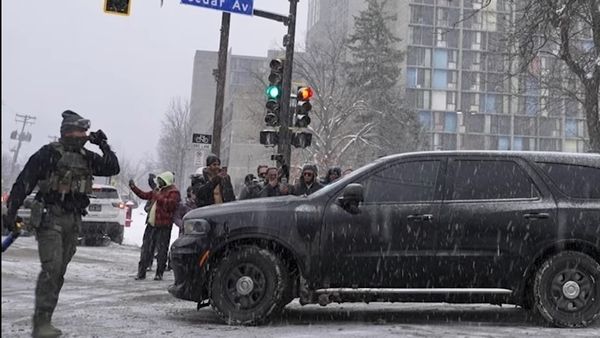
In the Aboriginal community of Pia Wadjarri, in the Mid West region of Western Australia, the voting station sits in the middle of a basketball court with more than a dozen homes clustered around.
The polling booth for the Indigenous voice to parliament referendum, about eight hours north of Perth, was open on Wednesday and locals, as well as people from distant cattle stations and farms, came in to cast their vote.
“Everyone who was eligible to vote got to do it,” Kylie Simpson, a cultural adviser and Wadjarri language teacher at the remote school of about a dozen students, says.

As campaigners head into the final days on the referendum hustings, voters in some of the most remote parts of Australia have already cast their ballots ahead of the official polling day on 14 October. The Australian Electoral Commission says more than 16,000 people living in remote Australian towns and communities casting a vote through roving mobile teams have voted since polls opened on 2 October.
Efforts to ensure some of the most remote Australians can have their say are no easy feat, with thousands of kilometres of red dirt, rivers, roads and gorges to traverse and thousands of workers.
And there are other obstacles. First Nations people living in remote communities in the Torres Strait and Western Australia have raised concerns that they have not received enough information ahead of the vote. Others have said elders simply did not know enough about the referendum just a day or two before pop-up polling stations visited.
The electoral commission says it has been working hard to improve access and outreach, visiting more communities than ever before with information campaigning through social media, Indigenous community radio and television stations, as well as traditional platforms to get the message out.

But the AEC acknowledges that turnout in remote areas “varies” due to size, the level of campaign awareness and engagement and what is happening in communities on the day.
In Pia Wadjarri, Simpson says many rely on word of mouth from family, friends, local businesses and social media to get the word out about the referendum and the voice, rather than offical videos, pamphlets or flyers.
“People from out here wouldn’t have had access to any information like that,” Simpson says. “It’s more what they’ve heard in conversations with other people and on Facebook and sharing things like that, we also sent notes home before the holidays so everyone knew they were coming in advance.
“We had all community members that were eligible voting yesterday. And then we also had members of the wider Murchison community and neighbouring stations that came to the settlement too.”
In the red centre of Uluru, where the voice to parliament’s seed was first planted, Central Land Council delegates have cast their vote.
“I was here six years ago, when we invited Australians to join us on a journey towards voice, treaty and truth-telling,” Central Land Council delegate and Uluru traditional owner Sammy Wilson said in a statement.
“Our council overwhelmingly voted yes this morning because we know that when decision-makers listen to our voices we end up with policies that help us, not harm us, and money is spent wisely.”
The AEC says that in Western Australia, almost 3,000 votes have been cast while in the Northern Territory more than 6,5000 people living in remote communities have voted.







